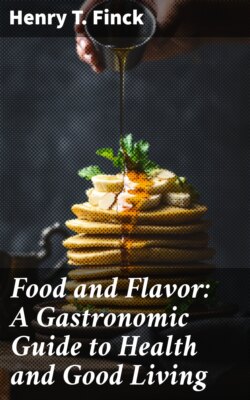Читать книгу Food and Flavor: A Gastronomic Guide to Health and Good Living - Henry T. Finck - Страница 24
На сайте Литреса книга снята с продажи.
AN AMAZING BLUNDER.
ОглавлениеTable of Contents
How far we have traveled away from that foolish, nay, criminal Puritan notion that enjoyment of the pleasures of the table is a reprehensible form of sensual indulgence—the notion which made Walter Scott's father pour hot water into the soup because the boy liked it!
That attitude was a blunder, a huge blunder, as the preceding pages prove.
A still bigger blunder, and one equally deplorable and mischievous, now claims our attention—a blunder so amazing, so incomprehensible that it seems almost incredible: the universal belief, among men of science as well as the laity, that the pleasures of the table come to us through the sense of taste.
How I happened to discover that this notion is a blunder, I now beg the reader's permission to relate briefly.
In 1878 Harvard University rewarded me for my hard work in the philosophical department (under Professors Bowen and Palmer) by giving me the Harris Fellowship, which enabled me to continue my study of physiological and comparative psychology for three years at the universities of Germany.
I recall vividly my boyish delight in the pleasures of the senses of sight, hearing, and smell. During my college course and afterwards I diligently studied the phenomena of these senses in man and animals in all the books and scientific papers I could find; and thus it came about that my first magazine articles were on the Ãsthetic Value of Odors, and The Development of the Color Sense. The first of these was accepted by W. D. Howells, for the "Atlantic Monthly" (December, 1880); the second, by Alfred Russell Wallace, for "Macmillan's Magazine" (London, December, 1879). I mention these things to show that the senses of man and animals have been a subject of special interest with me for more than four decades, and that when I went to Germany, I took up the study of them not as an amateur but as one prepared (as well as eager) to make original researches.
My most ardent desire was to work in the laboratories of the University of Berlin under Professor Helmholtz, whose monumental books on the sensations of tone and on the phenomena of sight had revealed so many secrets to the world of science. Unfortunately he was not lecturing on those subjects at that time. Moreover, reperusal of his books made me feel as if he had covered all the most interesting ground. I therefore looked about for a region in which I could do some exploring on my own account, and soon found it in the functions of the senses of smell and taste.
Concerning these two senses, the most absurdly incorrect notions were current at that time even among leaders in science. Grant Allen, known as "the St. Paul of Darwinism," voiced the current biological opinion when he wrote that with man "smell survives with difficulty as an almost functionless relic"; and Darwin himself wrote that this sense is "of extremely slight service" to man.
The king of German philosophers, Kant, who was an epicure, maintained that smell is the least important of our senses, and that it is not worth while to cultivate it. Nay, the king of epicures, Brillat-Savarin, wrote a famous book the very title of which, "Physiology of Taste," is a scientific blunder. Like everybody else, he believed in the existence of an infinite variety of tastes, and never suspected that, with the exception of sweet, sour, salt and bitter, all our countless gastronomic delights come to us through the sense of smell.
